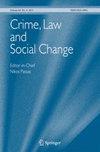The corporate legal profession’s role in global corruption: obligations and opportunities for contributing to collective action
IF 1
4区 社会学
Q3 CRIMINOLOGY & PENOLOGY
引用次数: 0
Abstract
Abstract Key corruption issues, like lack of transparency in beneficial ownership and money laundering, are inherently transnational. They are facilitated by professional services, like corporate lawyers, who work with various standards, regulations, and global financial flows that can move the proceeds of crime across the world. This paper uses reflective equilibrium to analyze the tensions between the philosophical principles of complicity and collective responsibility and the principles found in the professional role of lawyers in society to reflect on the corporate legal profession’s role in enabling corruption. Furthermore, this paper explores how these tensions can be addressed and how lawyers can be situated in anti-corruption collective action theory and practical collective action initiatives. For example, the legal profession has a collective obligation to maintain and self-patrol the profession’s ethics, primarily through their regulating authorities, and it should be considered to what extent these authorities are promoting anti-corruption standards or reprimanding lawyers who are complicit in corrupt acts. There is also an opportunity for corporate lawyers to use their role in society to develop more collective action initiatives to address issues of transnational corruption, which may include enforcing a higher collective standard in providing advice or advocating for legislators to fix regulations and promote legislation that addresses corrupt practices.公司法律专业在全球腐败中的作用:促进集体行动的义务和机会
关键的腐败问题,如受益所有权和洗钱缺乏透明度,本质上是跨国的。专业服务为他们提供便利,如公司律师,他们与各种标准、法规和全球金融流动打交道,这些流动可以将犯罪所得转移到世界各地。本文运用反思均衡分析了共谋和集体责任的哲学原则与律师在社会中的职业角色原则之间的紧张关系,以反思公司法律职业在助长腐败方面的作用。此外,本文还探讨了如何解决这些紧张关系,以及律师如何在反腐败集体行动理论和实践集体行动倡议中发挥作用。例如,法律职业有维护和自我监督职业道德的集体义务,主要是通过他们的监管机构,应该考虑这些当局在多大程度上促进反腐败标准或谴责参与腐败行为的律师。公司律师也有机会利用其在社会中的作用,制定更多的集体行动倡议,以解决跨国腐败问题,其中可能包括在提供咨询意见或倡导立法者制定规章和促进解决腐败行为的立法方面执行更高的集体标准。
本文章由计算机程序翻译,如有差异,请以英文原文为准。
求助全文
约1分钟内获得全文
求助全文
来源期刊

Crime Law and Social Change
Multiple-
CiteScore
2.50
自引率
0.00%
发文量
53
期刊介绍:
Covers crime and deviance at the global, national, regional and local level, worldwideHas a special focus on financial crime, corruption, terrorism and organizational crimeWelcomes criminological research in the areas of human rights, comparative and international criminal law and criminal justice Crime, Law and Social Change publishes peer reviewed, original research articles addressing crime and the political economy of crime, whether at the global, national, regional or local levels, anywhere in the world. The Journal often presents work on financial crime, corruption, organized criminal groups, criminal enterprises and illegal markets, state crime, terrorism and security issues, cybercrime, cross-border crime and environmental crime. In addition, Crime, Law and Social Change welcomes criminological research in the areas of human rights, comparative and international criminal justice, compensation and justice for serious crime victims, international criminal law and cooperation. Finally, the Journal publishes multi-disciplinary criminological research focusing on gender, age, racial and ethnic equality issues.
 求助内容:
求助内容: 应助结果提醒方式:
应助结果提醒方式:


